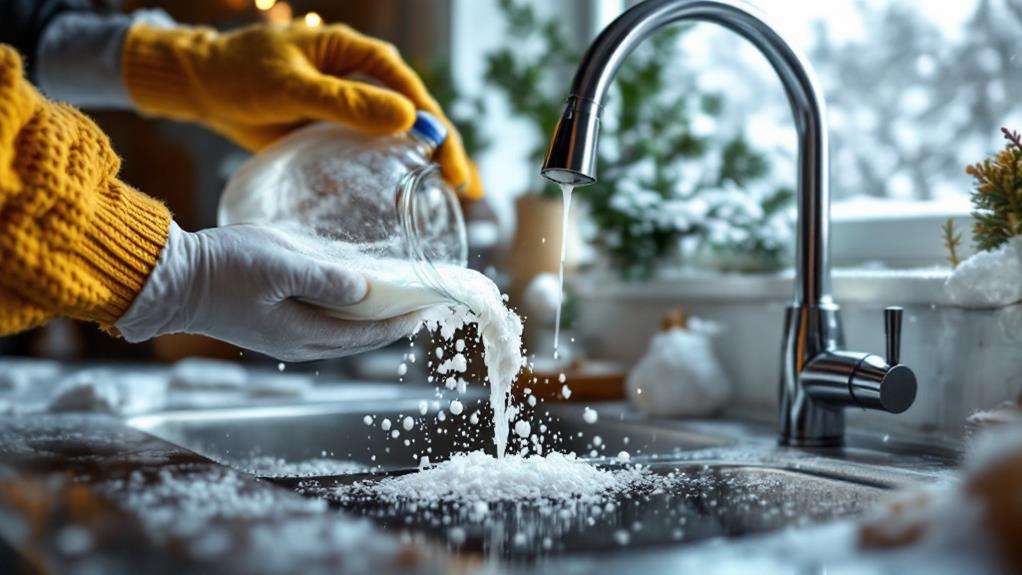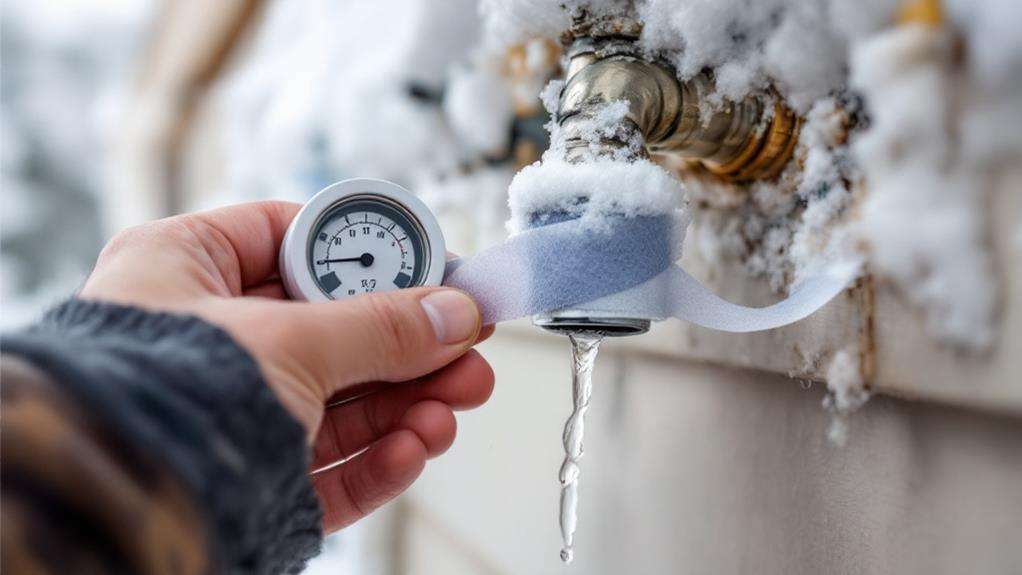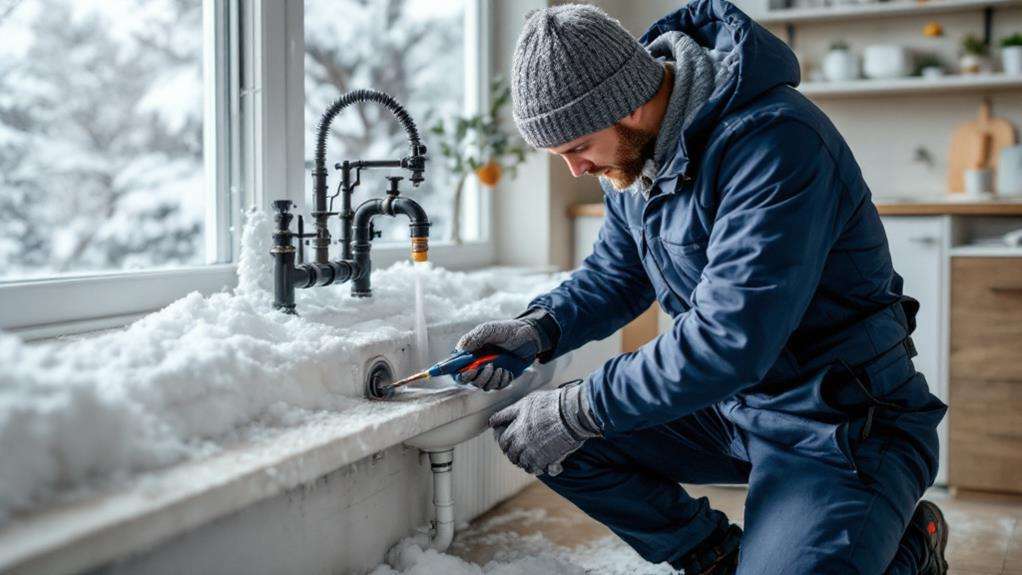How to Keep Your Drains Clear During Winter

To keep your drains clear during winter, focus on prevention and regular maintenance. Don't pour grease down drains, and use strainers to catch food particles. In bathrooms, remove hair and debris weekly, and install drain screens. Protect pipes from freezing by insulating exposed ones and maintaining a consistent home temperature. Use natural cleaners like baking soda and vinegar to break down buildup and remove odors. Schedule routine inspections with a professional plumber to identify and address potential issues. By following these tips, you'll avoid costly plumbing problems and guarantee your drains stay clear all winter long. Uncover more ways to safeguard your home's plumbing system below.
Prevent Grease Buildup
Never pour cooking grease down your drains. It's a common mistake that can lead to serious clogs, especially during winter when pipes are colder and grease solidifies more quickly. Instead, let hot grease cool and dispose of it in the trash. Avoid pouring hot grease down drains at all costs, as it can cause immediate damage to your plumbing system.
Use strainers in your kitchen sink to catch food particles and other debris that might contain grease. Empty these strainers regularly into the garbage. For dishes with oily residue, wipe them down with a paper towel before washing to remove excess grease. When you do wash greasy dishes, use cold water and plenty of dish soap to help break down the oils.
Consider using a grease-fighting dish soap or adding a small amount of vinegar to your dishwater to help dissolve grease. If you notice a slow drain, don't wait for it to worsen. Use a mixture of baking soda and vinegar to clean your drains monthly, followed by hot water to flush away any residual grease buildup.
Maintain Bathroom Drains
Bathroom drains require regular attention to prevent winter-related issues. To maintain your bathroom drains effectively, you'll need to schedule routine inspections and address any clogs promptly. Start by removing hair and debris from shower and sink drains weekly using a drain claw or plumber's snake. This simple task can prevent major blockages from forming.
Install drain screens in all your bathroom sinks and showers to catch hair and other particles before they enter the pipes. Clean these screens regularly to guarantee ideal performance. Don't forget to pour hot water down your drains once a week to help dissolve soap scum and prevent buildup.
If you notice slow drainage, act quickly. Use a plunger or a mixture of baking soda and vinegar to clear minor clogs. For persistent blockages, consider using an enzymatic drain cleaner that's safe for your pipes. Avoid harsh chemical cleaners, as they can damage your plumbing system.
During winter, pay extra attention to your bathroom's ventilation to reduce condensation. Excess moisture can lead to mold growth and pipe corrosion. Run exhaust fans during and after showers, and keep windows slightly open when possible to promote air circulation.
Protect Pipes From Freezing

As temperatures drop, protecting your pipes from freezing becomes crucial. Frozen pipes can burst, causing extensive damage to your home and plumbing system. To prevent this, start by insulating exposed pipes in unheated areas like basements, attics, and crawl spaces. Use foam pipe insulation or heat tape to wrap these vulnerable pipes, paying extra attention to those near exterior walls.
Keep your home's temperature consistent, even when you're away. Set your thermostat to at least 55°F (13°C) to maintain warmth throughout the house. Open cabinet doors under sinks to allow warm air to circulate around the pipes. On extremely cold nights, let faucets drip slightly to keep water moving and reduce the risk of freezing.
Monitor water usage and be alert to signs of freezing, such as reduced water flow or strange odors from drains. If you suspect a frozen pipe, don't use open flames to thaw it. Instead, use a hairdryer or heat lamp, working from the faucet end towards the frozen section. In severe cases, call a professional plumber to safely thaw your pipes and prevent further damage.
Use Natural Drain Cleaners
While protecting your pipes is important, keeping your drains clear is equally essential for maintaining a healthy plumbing system. During winter, you'll want to avoid harsh chemical cleaners that can damage your pipes and potentially freeze, causing more problems. Instead, opt for natural drain cleaners that are effective and eco-friendly.
One of the most popular natural methods is to use baking soda and vinegar. Pour half a cup of baking soda down the drain, followed by half a cup of white vinegar. Let the mixture fizz for about 15 minutes, then flush with hot water. This combination helps break down grease and remove odors.
You can also employ essential oils to keep your drains smelling fresh and deter bacterial growth. Add a few drops of tea tree, lemon, or eucalyptus oil to your natural cleaning mixture for added benefits. Another effective natural cleaner is salt mixed with hot water, which can help dissolve minor clogs and prevent buildup.
Remember to use these natural cleaners regularly as a preventative measure, rather than waiting for a major clog to develop. By incorporating these eco-friendly solutions into your routine, you'll keep your drains clear and your plumbing system healthy throughout the winter months.
Schedule Professional Maintenance

Professional drain maintenance is a crucial step in winter plumbing care. While you can handle many preventive measures yourself, scheduling routine inspections with a professional plumber can catch potential issues before they become major problems. These experts have the tools and knowledge to thoroughly assess your drainage system and address any concerns.
During a professional inspection, plumbers will monitor for clogs and use specialized equipment to identify blockages or damage that might not be visible from the surface. They can perform thorough cleanings, removing buildup that home remedies might miss. This is especially important in winter when freezing temperatures can exacerbate existing issues.
Consider scheduling a professional drain cleaning at least once a year, ideally before the coldest months hit. This proactive approach can save you from costly emergency repairs and guarantee your drains function optimally throughout the winter. Additionally, a plumber can provide personalized advice on maintaining your specific drainage system and recommend any necessary upgrades or repairs. By investing in professional maintenance, you're protecting your home from potential water damage and ensuring a stress-free winter season.
